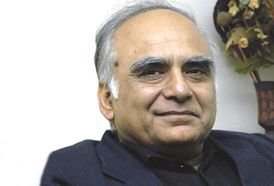"India must stay prepared for any emergency response"
October 10, 2014 | Friday | Interviews | By Rahul Koul Koul
India must stay prepared for any emergency resonse: Dr NK Ganguly
Dr NK Ganguly, former director general, Indian Council for Medical Research
â– What can India learn from the outcomes of the recent Ebola outbreak?
The key take-home messages for India is to have International health safety standards because we have to take into account the fact that people are travelling all over the globe and hence any outbreaks occurring anywhere in the world, there will be safety concerns for India. Safety concerns in India had been raised during the SARS outbreak, H5N1,H1N1, NIPA outbreak as well as during the Congo haemorrhagic fever and Chikungunya outbreaks. Hence we have to be prepared always for any emergency response so that we do not become paralyzed when such an eventuality comes.
â– How do you look at India's outbreak management?
The outbreaks which we have talked of before, many of them are of zoonotic nature spreading from domesticated animals to humans or have originated from wild animals from forests through human cycles. India has a system of Intra-sectoral expert groups which were setup particularly during H5N1 for management of outbreaks, in which secretaries and officials from Ministry of Health, Department of Animal Husbandry and Dairying (AH&D), Ministry of Environment and Forests, Ministry of Transportation all meet together to deal with the health situation and formulate a response.
â– Will India be able to cope with an outbreak of such large magnitude?
India at the moment is prepared. It now has two BSL- 4 laboratory facilities and as well as several BSL-3+ and BSL-3 laboratory facilities. For stopping the spread of disease in an outbreak, we have in place airport screening and other entry point response system. Now, India also has methods for quarantine and very quick methods for transportation of biological samples to labs. This time, India will be able to deal any such contingency through protocols devised by organizations such as National Center for Disease Control (NCDC) and National Institute of Virology (NIV).
â– How does government encourage new drug research for these rare organisms?
We do not have any drugs for many of these diseases except for a few. TAMIFLU (oseltamivir phosphate) is a medicine for flu treatment and flu prevention in adults and children was made in India under license. Drugs for others are in experimental category. Govt of India, through various research funding agencies, funds research in priority areas.
â– Since the recently prescribed drug for Ebola, Z Mapp, was prepared on genetically modified tobacco leaves, what will happen in India where we do not approve GM crops yet?
Z-Mapp is still in an experimental stage, under evaluation as new treatment regime, and like many such drugs is prepared on plant based expression systems under very strict control conditions but they are not genetically modified crops, and hence there should not be any problem.









